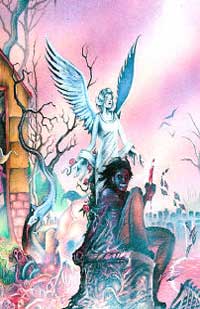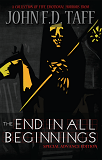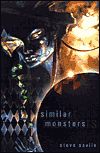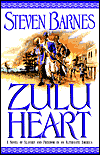
Cthulhu's Reign, edited by Darrell Schweitzer
Book Review by Joshua Palmatier
Have you read this book?
As you can imagine, an anthology based on the idea of Cthulhu Rising
once again and the return of the Old Ones isn't exactly full of happy
moments. Most of these stories have somber or disturbing endings, with a
few humorous ones sprinkled in for flavor. Keeping that in mind before
you start reading is a good idea, although most of those who will be
drawn to this anthology will already expect that, having read Lovecraft.
There are some strong stories in here, enough to make purchasing the
anthology worthwhile I think. I've marked my two favorites in bold, but
there were some other good reads as well. A couple of the stories didn't
catch my attention or hold it at all, but that's to be expected in any
anthology. I think Darrell Schweitzer, the editor, tried for a wide
variety of stories to reach the widest audience, so having a few I
didn't particularly like wasn't a surprise.
The stories seem to begin with those set with the Rising in our own times, then tending toward Risings or Returns that occur in the future, so the most SF-oriented stories are at the end. I will also mention that I have not read Lovecraft, so I can't comment on how true the stories are to the source material. But I also don't feel like the stories require that the reader have read Lovecraft. I enjoyed many of these regardless, and don't think the ones I "didn't quite get" were because I haven't read Lovecraft.
The Walker in the Cemetery by Ian Watson: When Cthulhu rises in this story, a group of sightseeing tourists get trapped inside a cemetery complex in Genoa. Some kind of field is erected around the necropolis, keeping them from the outside world. After this, the tourists are picked off one by one by Cthulhu, who also feeds them, until there is only one left... someone who must suffer a different, and more horrible, fate. This had a well-defined plot and played with the psychology of the characters in an interesting way.
Sanctuary by Don Webb: Here we see what life after the Rising might be like in a small Texas town called Doublesign. Some interesting plays on the reality of our world here, more reminiscent of Lovecraft than in the previous story. The plot here was more or less just stage props for how the world has changed and how people may (or may not) be adjusting to those changes.
Her Acres of Pastoral Playground by Mike Allen: I really liked this story. It was creepy and interesting and didn't deal with the way the world dealt with the Rising, but rather with how a single man dealt with it, and is dealing with it still. A quiet story that doesn't chill you with hideous blatant threats, but rather much more subtle and insidious ones. I can't really say much about the plot without ruining it though.
Spherical Trigonometry by Ken Asamatsu (translated by Edward Lipsett): The main premise of the Rising here is that Cthulhu invades through sharp angles, so a rich businessman builds a place of escape made only of curved surfaces, only to discover that he perhaps took the idea of angles too literally. As a mathematician I found the idea of buildings such a structure interesting to think about, but I'm not sure the twist at the end here was completely pulled off.
What Brings the Void by Will Murray: Here, the main character is a "remote viewer" and the government, struggling to survive in the new world, sends him to figure out what exactly the invaders are doing in a factory building outside of the void that was Richmond, Virginia. What he finds out gives a rather solid reason for why the Old Ones returned, what they are here for in the first place, probably the first story so far that tries to tackle that idea. The beginning of the story is a little rough, but it settles down.
The New Pauline Corpus by Matt Cardin: This story was a little bit difficult to read because the main character is reading from an academic paper (or is creating the paper, the distinction gets blurred toward the end on purpose) trying to reconcile the Rising with Christian religious scripture, so its heavily philosophical. The reconciliation is interesting (I won't spoil it by giving the basics of the interpretation) but there was little personal story for it hinged on.
Ghost Dancing by Darrell Schweitzer: This story tackles one of the possible reasons for why the return of Cthulhu occurred in the first place and how some of the survivors are attempting to find their own place in the new hierarchy. A good, personal story with some horrific connotations, such as the fact that maybe the actions of only a few people destroyed the world.
This is How the World Ends by John R. Fultz: This is probably one of the more gruesome stories so far, although what happens is expected. Here, we get to see some of the survivors taking refuge in a mine. A slightly different outcome in the end, in terms of perspective. An interesting read. Made me shudder. *grin*
The Shallows by John Langan: I really enjoyed this story as well, one of my favorites. We see how the main character is dealing with the destruction of the world, with him revealing what's happened slowly as he tells his new pet - a kind of crablike creature - about his wife and son. So we get to see what his world was like before, and we get to see how he's surviving now. The normalcy of his life is made subtly horrific by the changes he's made and has to deal with.
Such Bright and Risen Madness in Our Names by Jay Lake: Now this story is a slightly different twist on the main theme. Sure Cthulhu has risen, but here we have some resistance groups with a radical concept: don't fight the monsters, fight the humans who revere and support them. Great idea. I was interested enough I wanted the story to be expanded.
The Seals of New R'lyeh by Gregory Frost: This story had a much lighter tone than the rest, sort of a humorous, tongue-in-cheek slant on the theme of the anthology. Mostly this comes from the set of characters at the heart of the story. It was a quick easy read, and things don't work out as expected, but at least the main character was trying to rectify the situation.
The Holocaust of Ecstasy by Brian Stableford: This story was simply . . . weird, in a good way. It's by far the most bizarre story that is still easy to read and follow. It takes the idea that when Cthulhu rises, the world will be significantly different, perhaps unrecognizable, and the world presented here is definitely extremely odd. But in an interesting way. Not much of a narrative here, except an exploration of this new world and some philosophical thoughts.
Vastation by Laird Barron: I had a hard time with this story, mostly because I couldn't associate to the main character. His voice wasn't easy to follow, and he wasn't exactly someone you could like, and I wasn't certain exactly how Cthulhu fit into the scheme of things. There's a section where perhaps there's a comment on technology and that somehow WE are Cthulhu (brought about by the science), which was the most interesting part of the story for me, but it wasn't clear if that was the intent.
Nothing Personal by Richard A. Lupoff: The Rising occurs in the future here, with a rather nice explanation of why it happens rarely. A solid explanation for the Rising and the end of the world and why it occurs and why the Old Ones seek retribution against humanity (and why they'd even deign to notice us). And I liked the twist at the end. One of the better stories in the anthology.
Remnants by Fred Chappell: This is by far the longest story in the anthology, probably a novelette or novella. Also one of the more interesting ones, with two very distinct voices in the two main narrators. A unique idea, with one race attempting to save some of the survivors of the return of the Old Ones on Earth. A great way to end the anthology and certainly one of the stories that I enjoyed.
The stories seem to begin with those set with the Rising in our own times, then tending toward Risings or Returns that occur in the future, so the most SF-oriented stories are at the end. I will also mention that I have not read Lovecraft, so I can't comment on how true the stories are to the source material. But I also don't feel like the stories require that the reader have read Lovecraft. I enjoyed many of these regardless, and don't think the ones I "didn't quite get" were because I haven't read Lovecraft.
The Walker in the Cemetery by Ian Watson: When Cthulhu rises in this story, a group of sightseeing tourists get trapped inside a cemetery complex in Genoa. Some kind of field is erected around the necropolis, keeping them from the outside world. After this, the tourists are picked off one by one by Cthulhu, who also feeds them, until there is only one left... someone who must suffer a different, and more horrible, fate. This had a well-defined plot and played with the psychology of the characters in an interesting way.
Sanctuary by Don Webb: Here we see what life after the Rising might be like in a small Texas town called Doublesign. Some interesting plays on the reality of our world here, more reminiscent of Lovecraft than in the previous story. The plot here was more or less just stage props for how the world has changed and how people may (or may not) be adjusting to those changes.
Her Acres of Pastoral Playground by Mike Allen: I really liked this story. It was creepy and interesting and didn't deal with the way the world dealt with the Rising, but rather with how a single man dealt with it, and is dealing with it still. A quiet story that doesn't chill you with hideous blatant threats, but rather much more subtle and insidious ones. I can't really say much about the plot without ruining it though.
Spherical Trigonometry by Ken Asamatsu (translated by Edward Lipsett): The main premise of the Rising here is that Cthulhu invades through sharp angles, so a rich businessman builds a place of escape made only of curved surfaces, only to discover that he perhaps took the idea of angles too literally. As a mathematician I found the idea of buildings such a structure interesting to think about, but I'm not sure the twist at the end here was completely pulled off.
What Brings the Void by Will Murray: Here, the main character is a "remote viewer" and the government, struggling to survive in the new world, sends him to figure out what exactly the invaders are doing in a factory building outside of the void that was Richmond, Virginia. What he finds out gives a rather solid reason for why the Old Ones returned, what they are here for in the first place, probably the first story so far that tries to tackle that idea. The beginning of the story is a little rough, but it settles down.
The New Pauline Corpus by Matt Cardin: This story was a little bit difficult to read because the main character is reading from an academic paper (or is creating the paper, the distinction gets blurred toward the end on purpose) trying to reconcile the Rising with Christian religious scripture, so its heavily philosophical. The reconciliation is interesting (I won't spoil it by giving the basics of the interpretation) but there was little personal story for it hinged on.
Ghost Dancing by Darrell Schweitzer: This story tackles one of the possible reasons for why the return of Cthulhu occurred in the first place and how some of the survivors are attempting to find their own place in the new hierarchy. A good, personal story with some horrific connotations, such as the fact that maybe the actions of only a few people destroyed the world.
This is How the World Ends by John R. Fultz: This is probably one of the more gruesome stories so far, although what happens is expected. Here, we get to see some of the survivors taking refuge in a mine. A slightly different outcome in the end, in terms of perspective. An interesting read. Made me shudder. *grin*
The Shallows by John Langan: I really enjoyed this story as well, one of my favorites. We see how the main character is dealing with the destruction of the world, with him revealing what's happened slowly as he tells his new pet - a kind of crablike creature - about his wife and son. So we get to see what his world was like before, and we get to see how he's surviving now. The normalcy of his life is made subtly horrific by the changes he's made and has to deal with.
Such Bright and Risen Madness in Our Names by Jay Lake: Now this story is a slightly different twist on the main theme. Sure Cthulhu has risen, but here we have some resistance groups with a radical concept: don't fight the monsters, fight the humans who revere and support them. Great idea. I was interested enough I wanted the story to be expanded.
The Seals of New R'lyeh by Gregory Frost: This story had a much lighter tone than the rest, sort of a humorous, tongue-in-cheek slant on the theme of the anthology. Mostly this comes from the set of characters at the heart of the story. It was a quick easy read, and things don't work out as expected, but at least the main character was trying to rectify the situation.
The Holocaust of Ecstasy by Brian Stableford: This story was simply . . . weird, in a good way. It's by far the most bizarre story that is still easy to read and follow. It takes the idea that when Cthulhu rises, the world will be significantly different, perhaps unrecognizable, and the world presented here is definitely extremely odd. But in an interesting way. Not much of a narrative here, except an exploration of this new world and some philosophical thoughts.
Vastation by Laird Barron: I had a hard time with this story, mostly because I couldn't associate to the main character. His voice wasn't easy to follow, and he wasn't exactly someone you could like, and I wasn't certain exactly how Cthulhu fit into the scheme of things. There's a section where perhaps there's a comment on technology and that somehow WE are Cthulhu (brought about by the science), which was the most interesting part of the story for me, but it wasn't clear if that was the intent.
Nothing Personal by Richard A. Lupoff: The Rising occurs in the future here, with a rather nice explanation of why it happens rarely. A solid explanation for the Rising and the end of the world and why it occurs and why the Old Ones seek retribution against humanity (and why they'd even deign to notice us). And I liked the twist at the end. One of the better stories in the anthology.
Remnants by Fred Chappell: This is by far the longest story in the anthology, probably a novelette or novella. Also one of the more interesting ones, with two very distinct voices in the two main narrators. A unique idea, with one race attempting to save some of the survivors of the return of the Old Ones on Earth. A great way to end the anthology and certainly one of the stories that I enjoyed.
|
Click here to buy Cthulhu's Reign, edited by Darrell Schweitzer on Amazon
|
Cthulhu's Reign, edited by Darrell Schweitzer on Amazon

| More Books You Might Like |
Comment on Cthulhu's Reign, edited by Darrell Schweitzer
| Comments on Cthulhu's Reign, edited by Darrell Schweitzer |
| There are no comments on this book. |



